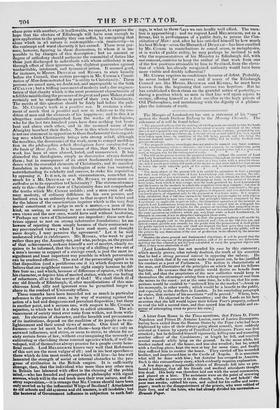The Marquis of Londonderry has sent a statement of his
"case" against the South Durham Railway to the 211orning Chronicle. The substance of it will be found below.
g ve to that district an unjust preference over other. unwrought coal districts, the mo- ."rhe proposed railway Ow the making of which powers are sought to take the lands of his Lordship and other dissentients. to the extent Of nearly one third of the whole line). is not required for any public purp,tse ; but is, or, the contrary, promoted by cer- tato proprietors of and speculators in, a list tint "retil ground which has Len agreed to be taken input' lease, on condition of the bill being passed, ;Intl who bring the measure forward muter the preext of public utility, but in reality for their own private advantage. " The proposed railway accordingly does not profess to connect any large commer- cial or mantifieturing towns or districts; and is not :Molded, in au engineering point of view, to the general transport sr passengers and merchandise, but is a mere coal road, or waggon way for the conveyance of coals. • • • • the bill seeks powers to carry the proposed railway. without the consent of Lord and Lady Londonderry, for one mile and furlongs through an ancient family estate of Lady Londonderry. consisting of 359 aeres, in a ring knee, with a mansion there- on; and it would pass within 40 yards of the mansi anti sever and debar front access to water the most valuable parts sof the estate, and be otherwise highly injurious
thereto. • • •
" The main object of the present bill is to enable its promoters to force a passage for their coal through the lands of Lott' Londonderry Ill others, evading the cus- tomary payment of way• leave rents, and thereby nett only to obtain for the district of coal ground before alluded, to an unfair advantage or Sonar, to the extent of the way- bill thus exteusiveltlY. tatititii,L:aydetlitve rents. It is respect- z:tlatt:.1 on any principles
Mho; competitor in took, for the 'Mir t
tx. to contRel him to relinquish his of en Mang that competitor to un-
u b
diminish in amount, It not to altogether extinguish those rents. ."Ir he pretence of benefit to the public is, that the proposed railway will enable its promoters to supply coal to the public at reduced cost ; but, as the bill does not. and indeed cannot, provide any security for the public that the promoters of it shall prefer the public interest to their own. and shall not demand the best price tiny can obtain for their coals. it is obs ions that the promoters of the bilL and not the public, will be the gainers by any diminution of the cost of production to be effected by the measure in question. " Besides the above general and fundamental objections, it will be proved that the estimates of the expense of the proposed railway, and of its revenues, are fallacious, and that the line selected is not the best calculated to carry the proposed objects into abet, if they were admissible at all."
[Lord Londonderry has not mended his case by this statement ; which merely proves, what nobody doubted, the truth of his assertion that he had a strong personal interest in opposing the railway. He i seems to think that f' he can only make that point out, lie has justified his conduct as a peer of Parliament. The notion is characteristic of the man, and illustrative of the principles on which he and his fellows legislate. He assumes that the public would derive no benefit from the bill, and that the proprietors of the new collieries would keep to themselves the advantages arising from a cheap conveyance of coal from the mines to the coast : yet at the same time, he tells us, that his com- petitors would be enabled to "undersell him in the market"—break up his monopoly, in other words ; which would be a benefit to the public, and especially to the dwellers in London. In his concluding paragraph he states, that certain of his assertions "will be proved." Where, how, or when ? He objected to the Committee; and the Lords on his bare • assertion that the bill would injure their fellow Peer's property, refused to read the bill a second time, and thus spared him the trouble and ex- pense of attempting even to prove his case.]


























 Previous page
Previous page